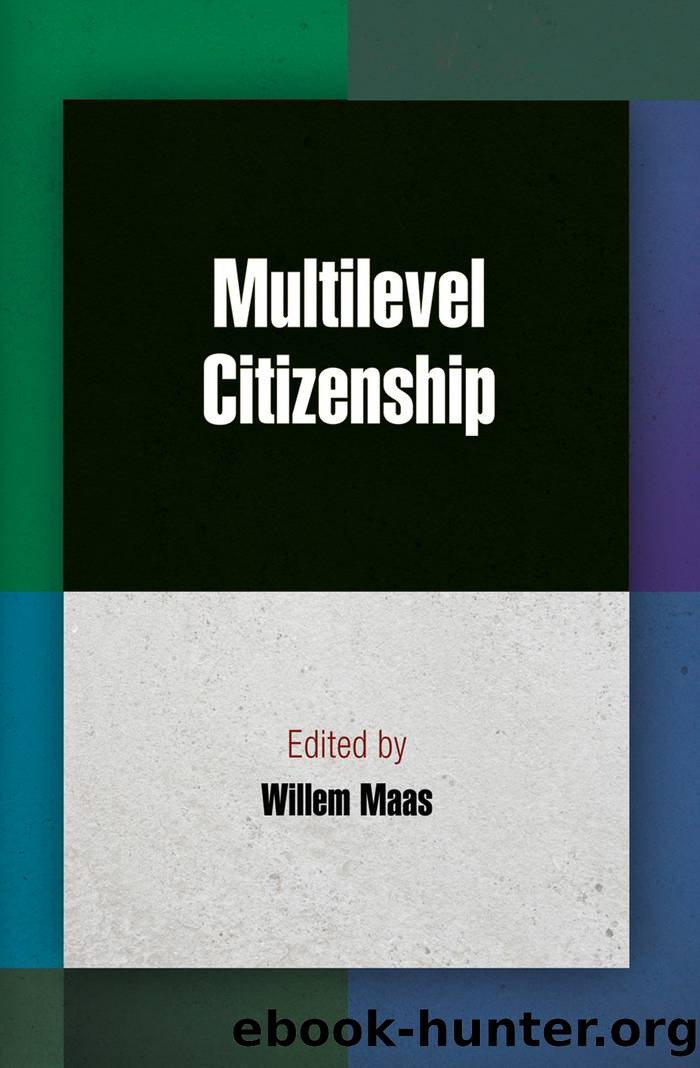Multilevel Citizenship by Maas Willem;

Author:Maas, Willem;
Language: eng
Format: epub
Publisher: University of Pennsylvania Press
Published: 2019-08-15T00:00:00+00:00
PART III
Local, Multinational, and Postnational
Chapter 8
Local Citizenship Politics in Switzerland: Between National Justice and Municipal Particularities
MARC HELBLING
Introduction
Although the nation-state is commonly regarded as a crucial actor and the most relevant level when it comes to citizenship politics, related policies are often executed or even shaped at the regional and the local levels. As a consequence, policies can vary from region to region or from town to town within the very same nation-state. Switzerland constitutes the most extreme case when it comes to local-level variations in citizenship policies. In this country, every municipalityâbe it a city of 100,000 inhabitants or a village of 400âhas the right to decide its own criteria for naturalizing foreigners. As a result, we observe a large range of different naturalization policiesâfrom the very generous to the very restrictiveâbetween regions, cities, and even villages. As regulations on the national and cantonal (subnational) levels are very sparse, each local political entity decides the formal procedures and criteria by which its alien residents are naturalized. Given the high degree of autonomy possessed by municipalities in this area, the naturalization procedures, the applied criteria, and consequently the ratio of rejected candidates vary greatly from one municipality to another.
This chapter explores local naturalization politics in an effort to explain why in some municipalities more candidates for naturalization are rejected than in others. I advance three political and cultural factors to clarify why some municipalities pursue a more restrictive naturalization policy than others. Given the high degree of Swiss federalism and the autonomy of local units in citizenship matters, I expected to find different understandings of citizenship; that is, diverging ideas of what it means to become a Swiss citizen. Although such ideological aspects certainly play a crucial role, I also investigated the contentious and political nature of citizenship politics, which led to a focus on the political actors in these municipalities and how influential they are in local politics. The results of this investigation appear to show that municipalities in which the Swiss Peopleâs Partyâa major right-wing populist partyâis powerful reject more applicants than others. Finally, I tested whether or not direct democratic decision-making procedures led to more rejections. My results demonstrate that such procedures provide an opportunity for right-wing populist parties to mobilize the people. Moreover, the rule of anonymity favors discriminatory decisions, as social control and external checks are absent to inhibit selfish behavior.
Besides exploring municipal naturalization politics in Switzerland, a second aim of this chapter is to discuss local citizenship politics more generally. Diverging applications of citizenship laws and understandings of nationhood are not found only in Switzerland. In fact, naturalization politics in many nation-states, as is the case in many policy fields, are decentralized to a certain extent. Especially in federal states such as Germany, but also in centralized states such as France, we can observe diverging applications of national regulations. Discussing a large variety of cases permits us to abolish the idea of homogeneous nation-states and demonstrate that citizenship can take different forms and meanings within a nation-state.
Download
This site does not store any files on its server. We only index and link to content provided by other sites. Please contact the content providers to delete copyright contents if any and email us, we'll remove relevant links or contents immediately.
Chaco's Northern Prodigies : Salmon, Aztec, and the Ascendancy of the Middle San Juan Region after AD 1100 by Paul F. Reed(338)
Law Enforcement Interpersonal Communication and Conflict Management by Brian Douglas Fitch(331)
Digital International Relations by Unknown(324)
Critical Perspectives on Human Security : Rethinking Emancipation and Power in International Relations by David Chandler; Nik Hynek(315)
The Enduring Color Line in U.S. Athletics by Krystal Beamon Chris M. Messer(309)
Skilled interpersonal communication: Research, theory and practice, Fifth edition by Owen Hargie(309)
Evidence-Based Policy Making in Labor Economics by Hamermesh Daniel S.;Nottmeyer Olga K.;Nottmeyer Olga;King Sarah;King Sarah;King Sarah;(277)
EPSO CAST Political affairs EU policies: How to succeed in the selection procedure by Franco Reverte José María(272)
Writing Public Policy - A Practical Guide to Communicating in the Policy Making Process by Catherine F. Smith(256)
Threshold Concepts in Women's and Gender Studies by Christie Launius Holly Hassel(249)
Criminological Theory in Context by John Martyn Chamberlain(249)
Tibeton Yoga Its Secret Doc by Evans-Wentz(245)
Positive Psychology and Spirituality in Counselling and Psychotherapy (Conflict, Ethics, and Spirituality, 12) by unknow(245)
Rothschild and Early Jewish Colonization in Palestine (Geographical Perspectives on the Human Past) by Ran Aaronsohn(244)
Social Problems, Social Issues, Social Science by James Wright(243)
Play in child development and psychotherapy: toward empirically supported practice by Sandra W. Russ(239)
Cognitive Development in Infancy and Childhood (Elements in Child Development) by Mary Gauvain(235)
Latin American Politics and Society by Gerardo L. Munck & Juan Pablo Luna(208)
What Makes a Social Crisis?: The Societalization of Social Problems by Jeffrey C. Alexander(206)
